|
|
|
Sort Order |
|
|
|
Items / Page
|
|
|
|
|
|
|
| Srl | Item |
| 1 |
ID:
144340
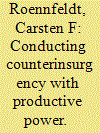

|
|
|
|
|
| Summary/Abstract |
Western governments tend to see power as synonymous with coercive force when they use their military forces in irregular armed conflicts abroad. Yet experiences from recent conflicts like Afghanistan and Iraq suggest that this understanding of power is unable to deliver the desired political ends. In an effort to better analyse and engage the political dynamics that dominate such conflicts, this article points to productive power. This theoretical perspective focuses on the micro-political dynamics that create legitimacy and mobilise people, which seminal counterinsurgency doctrines hold to be the goal.
|
|
|
|
|
|
|
|
|
|
|
|
|
|
|
|
| 2 |
ID:
178690
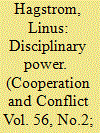

|
|
|
|
|
| Summary/Abstract |
This article draws on identity construction, emotions and a notion of productive power to address the question of why Swedish policymakers and public opinion are becoming increasingly supportive of NATO membership. It contributes theoretically by arguing that such textual phenomena intertwine with ‘disciplinary power’, which operates on the bodies of the subjects of power, exposing them to verbal and physical sanctions, a host of complex feelings and enhanced levels of self-disciplining. The article analyses 354 editorials and op-eds related to Sweden and NATO, published in the four biggest Swedish newspapers in 2014–2018; 1408 tweets, with a focus on 14 selected NATO campaigners and their advocacy; and semi-structured interviews with 12 such influencers. It concludes that Swedish NATO campaigners produce and negotiate emotional discourses in a way that targets other influencers and potential influencers by exposing them to ridicule and allegations of treason. While tendencies are similar on both sides of the debate, the article demonstrates that productive power currently intertwines with disciplinary power in a way that makes anti-NATO advocacy seem more fraught with personal risk than pro-NATO campaigning, and joining NATO appear to be the most normal, realistic and responsible policy option.
|
|
|
|
|
|
|
|
|
|
|
|
|
|
|
|
| 3 |
ID:
133964
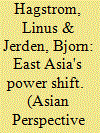

|
|
|
|
|
| Publication |
2014.
|
| Summary/Abstract |
The widespread debate on an East Asian power shift is generally based on the crude notion that power and capability are interchangeable. We critique this view and offer the alternative that power is the capacity of actors and discourses to produce effects- what we call relational and productive power, respectively. We also engage in a reflexive exercise by addressing the productive power of the power-shift debate itself, and emphasize the danger that this debate might enable the kind of realpolitik that it forebodes.
|
|
|
|
|
|
|
|
|
|
|
|
|
|
|
|
| 4 |
ID:
173403
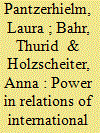

|
|
|
|
|
| Summary/Abstract |
In recent years, scholarship on international organisations (IO) has devoted increasing attention to the relations in which IOs are embedded. In this article, we argue that the rationalist-institutionalist core of this scholarship has been marked by agentic, repressive understandings of power and we propose an alternative approach to power as productive in and of relations among IOs. To study productive power in IO relations, we develop a theoretical framework centred on the concept of ‘metagovernance norms’ as perceptions about the proper ‘governance of governance’ that are shared among IOs in a governance field. Drawing on discourse theory, we contend that metagovernance norms unfold productive power effects, as dominant notions of how to govern well and effectively (i) fix meanings, excluding alternative understandings and (ii) are inscribed into practices and institutions, hence reshaping inter-organisational relations over time. To illustrate our framework, we trace metagovernance norms in discourses among health IOs since the 1990s. We find a historical transformation from beliefs in the virtues of partnerships, pluralisation, and innovation, towards discursive articulations that emphasise harmonisation, order, and alignment. Moreover, we expose the productive power of metagovernance norms by showing how they were enacted through practices and institutions in the global health field.
|
|
|
|
|
|
|
|
|
|
|
|
|
|
|
|
| 5 |
ID:
185988
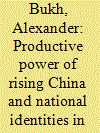

|
|
|
|
|
| Summary/Abstract |
Drawing on the insights of the constructivist school approach, this article joins the debate on the effects of rising China in Asia. The existing scholarship devoted to no-material aspects of China’s rise focused either on China’s ‘soft power’ initiatives or their reception by certain audiences. In this article, rising China and its governance model, are construed as a form of productive power, one that is expected to bring about not only shifts in material relations and perceptions but also transformations in the national identities of countries in the region. This article focuses on South Korea and Thailand, two countries with fundamentally different political systems but a similar pattern of recent interactions with China. It analyzes the policymaking elites’ discourse and public attitudes and explores the productive effects of China’s rise on national identities in the two countries. This article argues that the impact of China’s rise on elites’ discourse has been largely negligible with narratives on kinship and historical ties being used by the elites mostly for instrumental reasons. At the same time, this article suggests that the recent shifts in public attitudes towards greater acceptance of authoritarian values observed in South Korea and Thailand, may be indicative of the productive effect of rising China on national identities in both countries.
|
|
|
|
|
|
|
|
|
|
|
|
|
|
|
|
| 6 |
ID:
172424
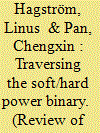

|
|
|
|
|
| Summary/Abstract |
Soft power and hard power are conceptualised in International Relations as empirically and normatively dichotomous, and practically opposite – one intangible, attractive, and legitimate, the other tangible, coercive, and less legitimate. This article critiques this binary conceptualisation, arguing that it is discursively constructed with and for the construction of Self and Other. It further demonstrates that practices commonly labelled and understood as soft power and hard power are closely interconnected. Best understood as ‘representational force’ and ‘physical force’ respectively, soft and hard power intertwine through the operation of productive and disciplinary forms of power. We illustrate this argument by analysing the Sino-Japanese dispute over the Diaoyu/Senkaku Islands. Both governments exercise representational force in constructing their respective versions of events and Self/Other. The soft/hard power binary itself plays a performative role as the Self is typically associated with soft power and the Other with hard power. The operation of productive power, moreover, privileges the attractiveness of the former and the repellence of the latter, and disciplinary power physically enforces these distinctions on subjects in both states. Finally, reinforced Self/Other distinctions legitimise preparations for violence against the Other on both sides, thus exposing how fundamentally entangled soft and hard power are in practice.
|
|
|
|
|
|
|
|
|
|
|
|
|
|
|
|
|
|
|
|
|